Michael Apted Amazing Grace Interview
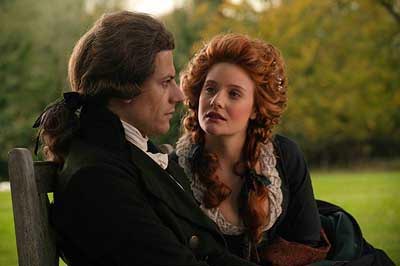
APTED HAS ?GRACE? IN NEW EPIC.
EXCLUSIVE Michael Apted Amazing Grace Interview by Paul Fischer in Los AngelesIt is amazing, looking at Michael Apted, that he made his Hollywood feature directorial debut some three decades ago with the now seminal classic, Coalminer?s Daughter. As comfortable making award award-winning documentaries, as well as films as varied as Gorillas in the Mist and The World is not Enough to his ?Up? series of docs, Apted, 66, is back behind the camera with Amazing Grace. This powerful British drama tells of The idealist William Wilberforce who manoeuvres his way through Parliament in 18th century England, endeavouring to end slavery in the empire. In a far ranging interview, Apted talks movies, Hollywood and 49 Up to Paul Fischer.
Paul Fischer: How much about Wilberforce did you know before agreeing to take this on?
Michael Apted: Not very much. I mean I knew about the period. I was very interested in William Pitt and that whole period. This was a catalyst in the end to the slave trade, to a whole period of reform. This was the English revolution as opposed to the French or American, which was peacefully executed as it were. But I knew a bit about it.
Paul Fischer: In fact Pitt would presumably be a subject all on his own I would imagine.
Michael Apted: Absolutely. So would John Newton. I mean this movie is full of other movies isn?t it?
Paul Fischer: So how concerned were you in taking on a subject that was incredibly complex and difficult to cinematically interpret in such a short period of time?
Michael Apted: I think the key was figuring out how to structure it. We were sent it as a biopic and it didn?t work at all. It also tends to be fairly heavily weighted towards the faith part of his life. But I had always been looking to do a political film, looking for some inspiration out of politics because I kind of get depressed by how contemptible politics has become and how we disregard it.
Paul Fischer: In Britain in particular?
Michael Apted: Well here as well. I mean people don?t vote, people seem uninterested in politics, seem, as I say, to have almost a feeling of contempt with politics and politicians and not without reason. But I don?t think that?s the way to live and so I?ve always been looking for a story which would shine a light on politics and get a sense of some inspiration from it.
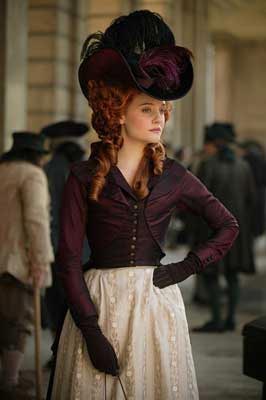 Paul Fischer: Well the days of political idealism seem to be very far away.
Paul Fischer: Well the days of political idealism seem to be very far away. Michael Apted: They do. Yeah, they do.
Paul Fischer: In trying to make a film that is purely a film yet is in some ways relevant to contemporary audiences, what is the balancing act that you have to strive for?
Michael Apted: Well there are a few balancing acts in this film. One is to keep the balance between the politics and the religion and that was important for me. I didn?t want to veer it over into becoming a faith film, nor did I want to diminish the importance and power of his religious idealism. And I think the tightrope you?re talking about is how can you get energy and light into a period film so it doesn?t become an artefact? It?s not just a dead thing and it has enough energy and activity in it to at least make people even think ?Well, isn?t this what we?re doing now? Aren?t I hearing this now?? So I just think it means, as I said, the structure is an important thing and I think the structure we found gave us a lot of energy because there?s something slightly desultory about - and I?ve done some bio pics - there can be something desultory about them as you plod on through people?s lives. By playing around with time a bit and using the romance in his life and then everything else being cherry picked off that, I think gave the film some energy to it and some page turning quality to it.
Paul Fischer: Is there an advantage to being a documentary film maker in your other life and bringing some of those lessons to the art of making a film like this?
Michael Apted: Yes, it?s my advantage. I think it?s my calling card and I think I have a documentary spirit so I think I approach everything in the sense that it?s from a documentarian?s point of view. Even James Bond for example, because I believe that truth is stranger than fiction, being a documentarian, so I think that documentary spirit informs everything I do, yes.
Paul Fischer: What were the challenges for you in casting because I would have thought that Ioan would not have necessarily been my immediate choice?
Michael Apted: I think the big issue for me was the age difference. I wanted to get that big generation gap between the three leads, you know between Wilberforce and Pitt and the establishment so I really had to find three young actors to play those roles and of course the studio went mad and said ?How are we going to sell this film?? because the leads are unknown. Well Ioan, who I met and liked a lot and thought he probably could really do it, had an advantage over others because he?s already got a sort of foot in the marketing door with the Fantastic Four so that helped but the other deal I had to make with the devil was, I would surround them with as big a celebrity cast as I could find, so it would give them the kind of naming value that they couldn?t have with the leading actors.
Paul Fischer: The British Film Industry is not exactly in a state of - well it has it?s moments.
Michael Apted: That?s all it has, you?re right. That?s why I left.
Paul Fischer: So when you?re making a movie like this, given the little amount as possible, as little as it can muster, what again are the challenges in doing a big film on a small scale?
Michael Apted: Well they?re considerable and I just think you have to marshal your finances. I decided to shoot the whole thing on location which would give me a bit more opportunity to have space in the film, to put air in the film, because it was very expensive to build stuff and I?d be stuck inside bogus walls and never be able to get outside. And also I decided on one or two key things, like the docks, to put all my CGI money that was in the budget into those scenes so there was, even if they?re only on for less than a minute or three or four minutes, you have a real sense of scale. And I think if you can choose your moments when you do present scale to the movie, which is in fact quite an interior movie, will seem bigger than in fact it is, so I think it?s a question of being focussed and a bit of smoke and mirrors in a sense.
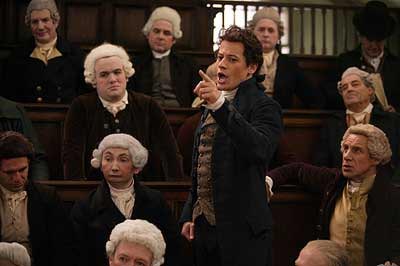 Paul Fischer: Are American audiences going to get this do you think?
Paul Fischer: Are American audiences going to get this do you think?Michael Apted: Well I think they?ll get it if we can get them into it. But just before you walked in we just had a screening for the Humane Society - so this film does touch a lot of things. It touches the faith community, it touches people who are interested in period films, it touches humane societies and it touches the issues of slavery. It touches black communities. So although no one has ever heard of Wilberforce in America, if you can get them in, if there is a certain excitement about seeing an historical film about something you don?t know what happened, seeing something new out of history, a story you don?t know, that?s the response I?ve got from Americans. That doesn?t mean they?ll pay money to go and see it. But it means if you can get them in, there is an excitement and something intriguing about seeing a piece of history that you don?t know what happens.
Paul Fischer: Now I saw a couple of weeks ago 49 Up which, I think I?ve seen probably from about 21 onwards is when I started watching it, and this is the most moving and the most interesting out of all the films, I thought. And one of the things that struck me dramatically about it is that a lot of the subjects expressed their reticence now about being involved in these movies. How much more do you think you can get them to do?
Michael Apted: I?m certainly going to lose one more, I think I?ll lose Suzy although I?ll try not to, but I want to keep it going. I think it?s only going to get more interesting as we deal with their mortality and retirement and grandchildren and illness and all this sort of stuff. You know, they always put me through it but it was more public this time and I think a lot of that was to do with the age difference being closer now as we get older, you know, now it is much more centred equals and also the fact of reality television rearing it?s ugly head over everything and people then thinking, ?Is this what we?re part of?? ?Are we being exploited?. ?Are we a cheap entertainment?? and all this. And all that turning 50 is also kind of, some people tend to be reflective about it. So it did surprise me. It really shocked me some of the way they were on at me. But it doesn?t discourage me from carrying on because I think, we had this screening from hell when they brought everybody in to London and we all watched it together, all of them and me.
Paul Fischer: How was that?
Michael Apted: Well it was alright in the end. I mean I was just dreading it. Especially like Jackie, the one who shouted at me, after her chapter had finished she came over and gave me a big kiss. You know, I don?t think she ever thought I?d use that stuff, she thought we?d just gentle it, but how could we not use it? So I was encouraged by that. I thought it does have a future. It would be pity to stop. I think why not, having come so far with it. Why quit now? I mean there?s no sense of closure about it. This is about life and the only closure for life is death.
Paul Fischer: When you look back at the early footage, when you first started making these films all those years ago, what do you see?
Michael Apted: It?s hard to say. I never watch anything but for some reason an Amsterdam documentary festival decided to play 7 plus 7 which is the second one. It?s not very long so I watched it. And it was better than I thought. I?d always thought that was a very poor one because they were so monosyllabic and spotty but you knew it was the beginnings of a really good idea. But it wasn?t bad and I always thought well maybe I got better at asking questions as I got more experienced but some of the questions there were good, the sort of question you?d want the person to ask them, they?d ask them. You know, you feel in your blood the question and then the person ask it. So I don?t know what I feel. I mean, as I said, I very rarely look at it and it?s so much part of my life. It?s the first I ever did and I?m still doing it. And it?s been the sort of biggest even in my professional life I think and will continue to be.
Paul Fischer: Your first American film was Coalminer's Daughter which was a seminal film I guess in your career. Did you think at that point that you would be a successful film maker as you?ve become?
Michael Apted: No I?ve had my ups and downs. In some ways it?s been downhill since Coalminers Daughter.
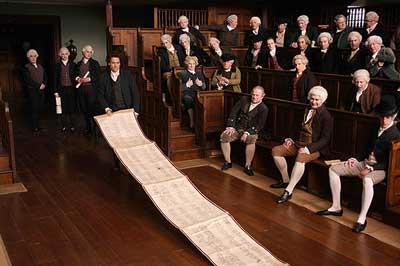 Paul Fischer: Probably mentioned Enough ...
Paul Fischer: Probably mentioned Enough ... Michael Apted: Yeah, well that was a disappointment. And you just worry about yourself. I spent a lot of time doing that film, as one does, and I thought it was alright. And then, you know, you get absolutely beaten up by everybody and you think ?Have I gone mad??. ?Why couldn?t I see it?? I don?t know what to say to it. I didn?t think it was going to be treated like it was but I am used to it now. I?m prepared for anything now, but it?s strange - the choices you make and whether you just get into the whole business of trying to make something work and you forget the big picture of it. I don?t know, but some things work and some things don?t. I was shocked that Rome was so popular. I was shocked. Because it was chaos from beginning to end.
Paul Fischer: Yes you did the first three of them?
Michael Apted: Yeah. Absolute chaos it was. And then it turned out. It?s weird. You can never tell with these things. You have to give up trying to anticipate things or having too great an expectation because it usually ends in tears.
Paul Fischer: Are you more impassioned now the older you get, are you more selective and what are you striving for at this point?
Michael Apted: I want to keep working. I?ve always strived, I mean that?s why Coalminers Daughter is so seminal for me. I?ve always strived to do challenging films that are popular. You know, I can make challenging films but then are they popular and this is a case in point with what we?re dealing with now. So that? what I?m striving to do. I grew up on European cinema but I really fell in love with American cinema in the 70s which was why I wanted to come here. It seemed to me to be a real golden age just looking at those lists of best pictures year after year. But they were provocative and challenging films and they were enormously popular and successful. So that?s what I strive for. I?m not striving to get rich, I?m not striving to get awards, I?m just striving to keep working and to do stuff that I think is challenging and fresh and that people will go and see.
Paul Fischer: Are your perceptions of the film industry different to what they used to be?
Michael Apted: Well they?re less rosy than they used to be. I think it?s a much tougher business for people like me and the sort of films I want to do and I think those films of the 70s, a huge percentage of them would never get made these days. And I think the business became much more bottom line orientated and much more a business and then the film companies became more multinational corporations. So I think there?s truly in the world of people who are making decisions about what gets made, there?s not as much film education or love of film. Film is much more seen as product, as content and I think that?s hard for all the creative people, whether they are actors, writers, directors, cinematographers but I think it makes life harder that people want a product out of us and there?s no real feel I think as there used to be from the time Hollywood started. I mean film has always been a business but you get the feeling that people making the decisions really knew what they were talking about - and now the people who green light us are many, many generations separated from the people who make the big financial decisions in these companies, you know, Universal NBC is a tiny percentage of GE and GE has its own work ethic and it wants to try and impose that work ethic on the motion picture and television industry and I think that makes it hard. I speak as a film maker and as President of the Directors? Guild. I think the creative community is sort of on the back foot.
Paul Fischer: What are you planning on doing next?
Michael Apted: I don?t know. I mean I?m looking for a movie. I?ve got a couple of documentaries coming up which I?ve just finished or finishing. One is a sequel to Married in America which is a film I made in 2002 about nine couples who got married in 2001. Now this is the next instalment of that and I?ve done a big documentary about one of the passions of my life which is football.
Paul Fischer: Really? Are you talking about proper football. Soccer?
Michael Apted: Yeah, yeah. Kicking football.
Paul Fischer: Not the American pro?
Michael Apted: Not American football, no, the kicking football. Because I?ve always been of the opinion that football has the ability to penetrate more cultures, more classes and any religious or political ideas.
Paul Fischer: From which perspective?
Michael Apted: Well I took the World Cup and I did seven stories. I did South Africa: how football is intertwined with the politics of South Africa. Has been since the ANC because they?re doing the next World Cup and how important to the history of the country football has been. I did Iran: I did how football is a tipping point for women?s rights and women are very agitated about football. They play football but they?re not allowed to go and see men play and all this. I did that. And I took an Iranian woman journalist to Germany to cover the Iranian team and the South African legislators who are going to mount the next World Cup were in and I did a social empowerment in South America: how football is used to empower communities. I did that story. I did slavery in Africa: I did the story in Senegal of ex-professional players who built an academy with money they had raised to stop the slave trade in young African footballers. I did the faces of racism in Europe. I did the neo-Nazis and then the attempts in other European countries to use football as a bridge between communities. And I did the American team, you know, their idea that no one cares a jot that they?re the biggest kind of sporting country in the world, about that game. So I took those stories and each had elements in Germany. So it was a big job. I shot it for about two years.
Paul Fischer: When do WE SEE it?
Michael Apted: I deliver it at the end of this month to Pathe who are distributing it. Who are distributing it here? I don?t know.
Paul Fischer: Will it go to Cannes?
Michael Apted: Hopefully, yeah. Hopefully it will be ready for Cannes. I tried to get it ready for Berlin but I didn?t have time.
Paul Fischer: Is documentary really your primary passion?
Michael Apted: No. I think I?m a documentary soul but no, I think my prime passion is doing the narrative movies. It pays the rent and it?s just a bigger job. It?s a bigger pool. I love the fact that I can move around and I do television work as well which I like. I like the energy of that.
Paul Fischer: Did you become a lot more cynical as a film maker the older you get?
Michael Apted: No I don?t think so. I don?t think this film speaks to that.
Paul Fischer: It doesn?t - it?s a very old fashioned, idealistic film.
Michael Apted: Yeah, I think so. I think that speaks to me more than - I don?t think I?m particular cynical. I?m more interested idealism and as I get older I see more the value of it and I see that fact that it?s missing and you have to be so careful about it but I wish people were a bit more idealistic and humane about the society in which we live and less motivated by shareholder prices and whatever.
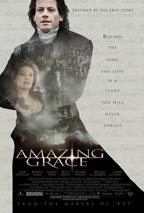
Amazing Grace
Starring: Ioan Gruffudd, Albert Finney, Michael Gambon, Benedict Cumberbatch, Romola Garai, Rufus Sewell, Ciaran Hinds, Jeremy Swift, Robert Roy Collins, Nicholas Day, Georgie Glen, Toby Jones, David HuntDirector: Michael AptedMichael Apted, whose claim to fame till now has been the respected 7 UP documentary series, directs this lavish costume drama whose heart is as big as its budget. Though a marked departure, Apted?s idealistic interests are well served by the story, which is based on the true tale of the 18th-century British politician William Wilberforce (Ioan Gruffudd, who played Horatio Hornblower in the HORNBLOWER series). Though as a young man Wilberforce is torn between politics and the church, he is inspired to action by John Newton (Albert Finney), a penitent monk who is haunted by his past as a slave-ship captain. Wilberforce makes it his mission to end slavery in the British Empire, and, aided by a small band of radical thinkers and unlikely supporters, he annually presents a bill for abolition to Parliament.When the war with France generates a patriotism in the people that makes opposition to slavery seem seditious, Wilberforce becomes disillusioned, and he retires to his cousin?s (Nicholas Farrell) house, physically ill and emotionally destroyed by his perceived failure. When he meets the beautiful and righteous Barbara Spooner (Romola Garai, AS YOU LIKE IT), however, he gains new determination to pursue his dream of abolition. The talented cast includes Michael Gambon as Lord Fox, an old gent who turns out to be more lucid than anyone would have guessed, as well as Senegalese musician Youssou N?Dour as Oloudaqh Equiano, a regal former slave turned activist. Terrence Malick (BADLANDS), who produced the film, leaves his mark in the stunning visuals.
MORE





